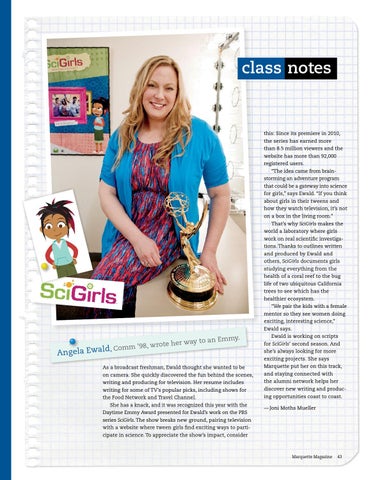class notes
this: Since its premiere in 2010, the series has earned more than 8.5 million viewers and the website has more than 92,000 registered users.
“The idea came from brain-
storming an adventure program that could be a gateway into science for girls,” says Ewald. “If you think about girls in their tweens and how they watch television, it’s not on a box in the living room.”
That’s why SciGirls makes the
world a laboratory where girls work on real scientific investigations. Thanks to outlines written and produced by Ewald and others, SciGirls documents girls studying everything from the health of a coral reef to the bug life of two ubiquitous California trees to see which has the healthier ecosystem.
“We pair the kids with a female
mentor so they see women doing exciting, interesting science,” Ewald says.
, Comm
Angela Ewald
r way to an ’98, wrote he
Emmy.
Ewald is working on scripts
for SciGirls’ second season. And she’s always looking for more exciting projects. She says
As a broadcast freshman, Ewald thought she wanted to be
Marquette put her on this track,
on camera. She quickly discovered the fun behind the scenes,
and staying connected with
writing and producing for television. Her resume includes
the alumni network helps her
writing for some of TV’s popular picks, including shows for
discover new writing and produc-
the Food Network and Travel Channel.
ing opportunities coast to coast.
She has a knack, and it was recognized this year with the
Daytime Emmy Award presented for Ewald’s work on the PBS
— Joni Moths Mueller
series SciGirls. The show breaks new ground, pairing television with a website where tween girls find exciting ways to participate in science. To appreciate the show’s impact, consider
Marquette Magazine
43
